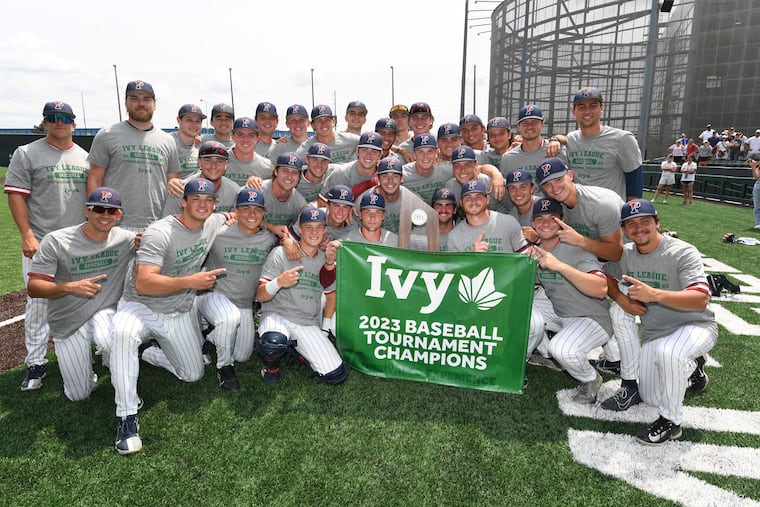Penn baseball advances to first NCAA Tournament since 1995 with rout of Princeton
The Quakers, who are on an eight-game winning streak, will learn their seed and location for the tournament on May 29.

The last time Penn baseball made it to the NCAA Tournament was 1995, and their starting third baseman was Team USA manager Mark DeRosa. But move aside, DeRosa. The Quakers are coming back this year.
The Quakers routed Princeton, 16-3, on Monday to cap off a perfect record (3-0) in the inaugural Ivy League Baseball Tournament and earn an automatic berth in the NCAA regional round.
Penn will find out its seeding and location of its regional during the NCAA Tournament Selection Show on May 29 (noon, ESPN2). The first round comprises of 64 teams split into 16 regionals in a double-elimination format. The winner of each regional will move on to the super regionals and play a best-of-three series for a berth in the College World Series.
The Quakers (32-14) carry an eight-game winning streak into the NCAA Tournament.
“Last year we felt like we should have gone to a regional, but on the last day of the season, we just didn’t play well, and Columbia beat us,” said Penn coach John Yurkow, who was awarded Ivy League coach of the year last week. “I just felt like these guys that came back had a real sense of urgency. … I can’t say enough good things about the senior leadership on this team.”
Statistical leaders
Leading the way was a pair of freshmen: Shortstop Davis Baker went 2-for-4 with a home run and 2 RBIs, while right fielder Jarrett Pokrovsky hit a grand slam in the third inning.
“They don’t play like freshmen, they really don’t,” Yurkow said. “They’re great kids, they’re baseball kids. They just love to play, and they’re really good competitors. There’s never a moment that’s too big.”
» READ MORE: Why Scott Bandura, one of college baseball’s top hitters, plays with Jackie Robinson’s No. 42 tattooed on his arm
Pokrovsky, from Pittsgrove, N.J., was named most valuable player of the tournament. Junior third baseman Wyatt Henseler went 2-for-4 with two doubles.
Cole Zaffiro got the win, allowing one earned run on six hits in five innings. The junior right-hander had four strikeouts and three walks.
For Princeton, Mike Scannell went 3-for-4 with a home run and a double. Scott Bandura, a Philadelphia native and former Anderson Monarch, went 1-for-4 with an RBI.
What we saw
Penn got on the board early after Henseler walked, advanced on a passed ball, and scored on a Ben Miller double in the top of the first. But the Quakers broke the game open with 12 runs across the third and fourth innings.
Penn and Princeton had nine hits apiece, but the Quakers’ plate discipline was the difference. Every Quaker walked at least once, totaling a season-high 14. Seven Penn batters were also hit by pitches. The Quakers were able to capitalize on a depleted Princeton bullpen, as the Tigers were playing their fourth game in three days.
“Those guys were fatigued,” Yurkow said. “They’re throwing some guys who haven’t really pitched a lot, and it really showed. They hit some guys; they couldn’t command the ball, and we made them pay.”
Penn was also able to rally in the clutch, batting .400 with 11 RBIs in two-out situations.
Game-changing play
While the game started off within reach for the Tigers, the momentum shifted in the top of the third. Second baseman Cole Palis led off with a single and advanced to third on a Henseler double. Princeton intentionally walked Miller to load the bases but then hit Baker on the head with a pitch to plate a run.
Pokrovsky immediately made Princeton pay, launching a ball down the left field line for a grand slam, just the second home run of his college career.
“[I was sitting] fastball,” Pokrovsky said. “And I ended up getting one. Actually, when [Princeton] called the time out, I relaxed a little bit more, so I was able to focus up a little bit, get a good swing off.”
» READ MORE: What’s propelled No. 1 Penn baseball to the top of nearly every Ivy League stat? Pitching.
Pokrovsky’s home run also chased Princeton’s starting pitcher, Tom Chmielewski, from the game and forced the Tigers to dig into their bullpen early. In the next inning, Princeton used three pitchers and surrendered eight runs on one hit, an error, six walks, and two HBPs.
“At the beginning of the year, we struggled. We struck out a lot,” Pokrovsky said. “In practices, we focused on it: Pick a pitch that you wanted to hit. In the past weekend of the tournament, I feel like we did that the best, which is why we came out on top.”